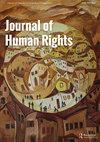Solving old problems or making new ones? Blockchain technology for the protection of refugees and migrants
IF 1.6
2区 社会学
Q3 INTERNATIONAL RELATIONS
引用次数: 0
Abstract
Abstract Blockchain technology has applications that can revolutionize political and economic governance. Although most of the academic literature on blockchain has focused on Bitcoin, there is a need to look at the feasibility of new humanitarian applications. This study will proceed in two steps. First, it surveys current theoretical and practical work on how blockchain can be used to help protect the human rights of migrants and refugees, primarily through creation of digital identities. Then it conducts a critical examination of two major cases: the Building Blocks initiative by the World Food Programme in Jordan and the Rohingya Project. We find that blockchain can be useful in empowering vulnerable individuals, but the empowerment of organizations creates potential human rights risks, such as the infringement of privacy and discrimination. Therefore, adequate safeguards should be in place to ensure that blockchain initiatives meet their true purposes of protecting the most vulnerable groups.解决老问题还是制造新问题?区块链技术保护难民和移民
区块链技术的应用可以彻底改变政治和经济治理。尽管大多数关于区块链的学术文献都集中在比特币上,但有必要研究一下新的人道主义应用的可行性。这项研究将分两步进行。首先,它调查了目前关于如何利用区块链来帮助保护移民和难民人权的理论和实践工作,主要是通过创建数字身份。然后,它对两个主要案例进行了批判性审查:世界粮食计划署(World Food Programme)在约旦的“构建模块”(Building Blocks)倡议和罗兴亚项目(Rohingya Project)。我们发现区块链在赋予弱势个人权力方面是有用的,但赋予组织权力会带来潜在的人权风险,例如侵犯隐私和歧视。因此,应采取适当的保障措施,以确保区块链倡议达到其保护最弱势群体的真正目的。
本文章由计算机程序翻译,如有差异,请以英文原文为准。
求助全文
约1分钟内获得全文
求助全文

 求助内容:
求助内容: 应助结果提醒方式:
应助结果提醒方式:


